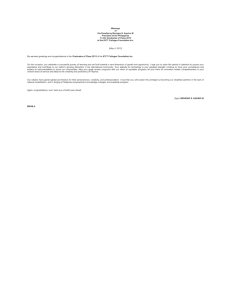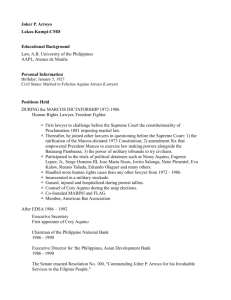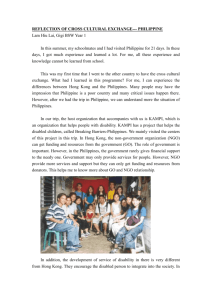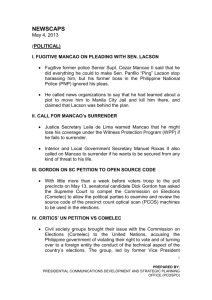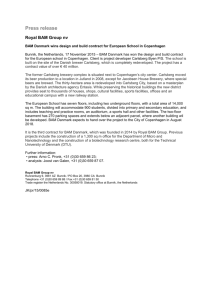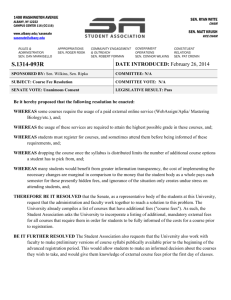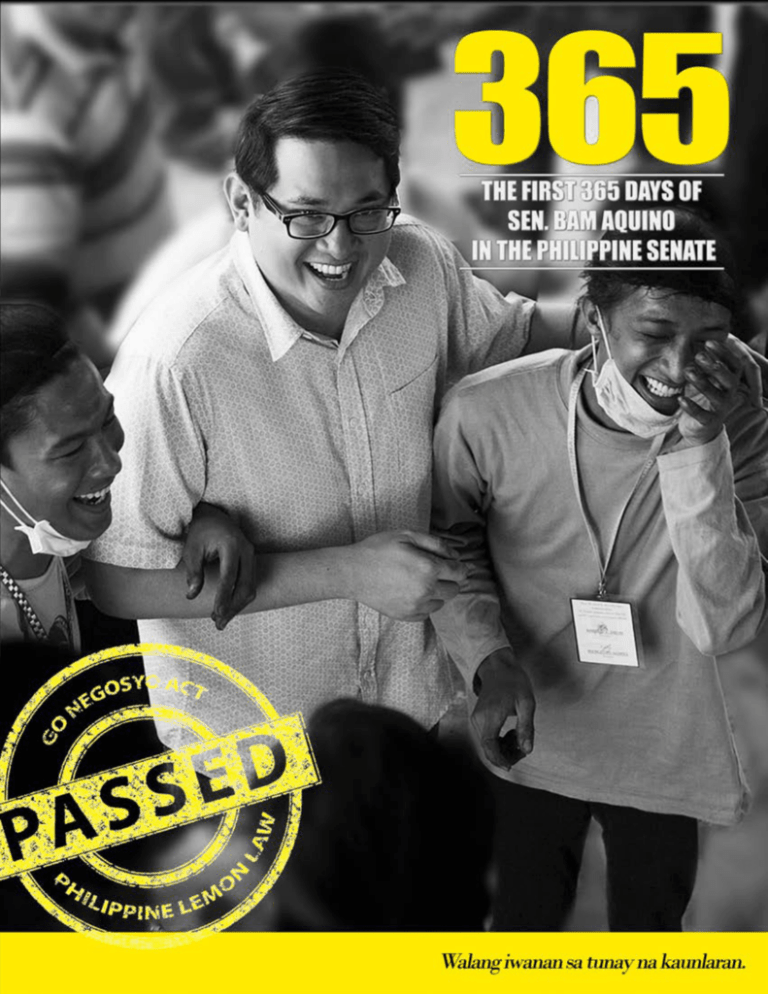
1
© 2014 By the Office of Senator Paolo Benigno “Bam” A. Aquino IV
Rm. 510, 5th Floor, Senate of the Philippines,
GSIS Financial Center, Roxas Boulevard, Pasay City
Tel. No. (632) 552-6601 | Fax: (632)552-6601 loc 8623 | Email: team.bamaquino@senado.ph
All Rights Reserved. No part of this publication may be reproduced in any form or by any means electronic or
mechanical, without written permission from the publisher.
Cover photo: Sen. Bam Aquino with Kalasag onion farmers.
San Isidro, Nueva Ecija
Photo: John Paramio
2
3
TABLE OF CONTENTS
“We should ensure that
as our economy grows,
no Filipino is left behind.”
Initial stages of bag weaving.
Rags2Riches
Photo: Maine Manalansan
1
INCLUSIVE GROWTH
CHALLENGE
7
TRADE, COMMERCE
& ENTREPRENEURSHIP
39
4
Portrait of Sen. Bam Aquino.
Photo: Paulina Uy
51
PROGRAMS &
ADVOCACY
81
CONNECT WITH
SEN. BAM AQUINO
YOUTH
5
MESSAGE
Dear friends and fellow Filipinos,
When I think of the past 365 days, I think not only in terms of my own personal journey from the private
sector to the Senate; I think also in terms of our shared journey and what we had all endured and
overcome as a people.
This past year, we witnessed great upheavals that rocked the foundations of our different institutions
and communities. The people cried out for general reform. We still have a long way to go, and with
vigilance, I am certain that our country will emerge from these challenges stronger and more resilient
than before. Huwag po tayong bibitiw dahil mahaba pa po ang ating tatahakin sa Tuwid na Daan.
We also witnessed massive death and destruction because of a number of man-made and natural
calamities in different parts of the country. But while we had lost thousands of lives and billions of
pesos worth of food, livelihood, infrastructure, and industry, we have also risen from the debris and
have begun to rebuild again. Our shared resilience, courage, commitment, and love for country and
fellowmen have made us stronger and savvier as a people. Indeed, as a popular social media meme had
pointed out, “the Filipino spirit is waterproof.”
These and many other stories make me feel immensely proud to be Filipino. For despite all the trials and
challenges we’ve hurdled this year, we still have what it takes to succeed as a country. The government’s
reforms have made us one of Asia’s rising stars and breakout economies—and, with the right policies
and programs in place, we can make true inclusive growth a reality for every Filipino.
This book is my humble offering to you, as a valued partner of our push for inclusive growth and a better
life for our countrymen. Just as you have entrusted in me the responsibility to serve our people, I trust
that we can continue to work together to unlock the potential of our great country. My Tito Ninoy had
once said that “the Filipino is worth dying for,” but I also believe that the Filipino is worth living and
working hard for.
Thank you for being an inspiration to us.
Kung lahat po tayo ay magsasama-sama, walang maiiwan sa pag-angat ng bansa.
Tuloy pa po ang laban.
Very truly yours,
SENATOR BAM AQUINO
16TH CONGRESS, FIRST REGULAR SESSION
JULY 22,
2013
TO
JUNE 11,
2014
ENACTED INTO LAWS
RA 10644 GO NEGOSYO ACT
RA 10642 PHILIPPINE LEMON LAW
APPROVED ON 3RD READING (JULY 30, 2014)
SBN 2212 YOUTH ENTREPRENEURSHIP BILL
PENDING ON 2ND READING
SBN 2210 POVERTY REDUCTION THROUGH
SOCIAL ENTREPRENEURSHIP (PRESENT) BILL
FILED COMMITTEE REPORT (JUNE 16, 2014)
FAIR COMPETITION ACT
BAM AQUINO
6
7
INCLUSIVE
GROWTH
CHALLENGE
Roadside vegetable vendor.
Quezon City
1 John Paramio
Photo:
2
INCLUSIVE GROWTH CHALLENGE
In the book Breakout Nations: In Pursuit of the Next Economic Miracles, author and head of emerging
markets at Morgan Stanley, Ruchir Sharma, identifies the Philippines as one country—alongside Turkey
and Nigeria—that will: “1.) grow faster than market expectations, and 2.) beat their peer groups, the
two conditions that he says create a breakout nation.”[1]
Sharma cites several factors that contribute to the Philippines’s X-factor at a time when many countries
are still reeling from a global recession: a young population—half of which is under 21, a well-educated
and English-speaking workforce, having “the world’s fifth-largest share of natural resources”, and
reforms being implemented under the administration of President Benigno Aquino III.
“Its average income of just $2,500 [Php108,000 annually or Php9,000 a month – ed.] leaves room for
growth,” writes Sharon Kahn of the Columbia Business School’s Chazen Global Insights, in her review of
Sharma’s book.
And, indeed, that is the challenge facing both government and the private sector today: how to
capitalize on unprecedented growth, critically acclaimed reforms, and global confidence in order
to make growth more inclusive and felt by almost 100 million Filipinos across the archipelago and
around the world.
For the government, inclusive growth is the desired outcome of a tangled web of factors that require
more than just one administration—and certainly more than just government on its own—to tackle.
For the Filipino people, it’s a long- and tightly-held dream of escaping poverty, of food on the table, of
education, of prosperity, of families reunited thanks to opportunities back home.
It may be the country’s biggest challenge yet—alongside sustaining well-placed reforms—but the
Philippines is in that sweet spot of timing, opportunity, and momentum. If we get our act together to
push for the right legislation, policies, programs, and public-private partnerships, the Philippines could
very well take off and succeed, making the dream of a better life real for every Filipino family.
[1] “10 Breakout Nations to Watch” by Sharon Kahn in Columbia Business School’s Chazen Global Insights.
http://www8.gsb.columbia.edu/chazen/globalinsights/node/199#.U9GdhPmSxqU. Last accessed on July 25, 2014.
3
ACCOMPLISHMENTS
CHALLENGES
19.1%
of the population
are poor.-PHILIPPINE STATISTICS
AUTHORITY (PSA), 2013
-NATIONAL ECONOMIC DEVELOPMENT
AUTHORITY (NEDA), 2013
From 2012, the Philippines
received an upgrade of
-DEPARTMENT OF LABOR AND EMPLOYMENT
(DOLE), JANUARY 2014
*THESE INVESTMENT GRADE RATINGS SHOW THE IMPROVEMENT IN THE
INVESTMENT CLIMATE OF THE COUNTRY. THESE WOULD BRING DOWN
BORROWING COSTS AND WILL ATTRACT MORE FOREIGN INVESTMENTS.
REFERENCE: HTTP://WWW.INTERAKSYON.COM/BUSINESS/58184/EDITORIAL--WHAT-INVESTMENT-GRADE-MEANS-FOR-FILIPINOS---AND-WHAT-IT-DOESNT
4
TRABAHO, NEGOSYO, EDUKASYON
THE FULFILLMENT OF THE “KUNG WALANG CORRUPT, WALANG MAHIRAP” PROMISE
Four years into the administration of
President Benigno Aquino III, the Filipino
public and the world have seen how the
government has placed anti-corruption
efforts squarely in the frontline of
the Aquino administration’s agenda.
Fiscal reforms, better governance, and
increased investor confidence have put
the Philippines back on the global map,
making it an economy to reckon with
in Asia.
As the national government continues
its efforts to purge corruption, Sen. Bam
Aquino has chosen to focus on three
critical elements that would complete the
“…walang mahirap” part of Pres. Noynoy
Aquino’s campaign promise. These are
trabaho (jobs), negosyo (business and
livelihood), and edukasyon (education).
KEYS TO UNLOCKING INCLUSIVE GROWTH
5
For Sen. Bam, investor confidence would
mean very little without the creation of
actual jobs and opportunities for Filipinos
here in the Philippines, and growth would
mean nothing if it does not raise people out
of poverty.
6
TRADE,
COMMERCE AND
ENTREPRENEURSHIP
CAMPAIGN PROMISES FULFILLED
GO NEGOSYO ACT | PHILIPPINE LEMON LAW
PRESENT BILL | TAX REFORM MEASURES | PRICE WATCH | SENATE INVESTIGATIONS
O
ne of the functions of a Philippine senator is to preside
as chairperson of one or more Senate committees. These
committees are responsible for hearing the bills that are
referred to them, conducting investigations within their purview,
and tackling other important matters within their jurisdiction.
In 2013, Sen. Bam Aquino was elected as chairperson of the Senate
Committee on Trade, Commerce, and Entrepreneurship. As the
name suggests, the committee exercises oversight functions over
matters relating to all business, such as domestic and foreign trade,
quality control, and stabilization of prices of commodities, consumer
protection, and the promotion of entrepreneurship, among others.
A multi-award winning social entrepreneur and a Young Global
Leader of the World Economic Forum (2006), Sen. Bam brings his rich
experience in social enterprise to the Philippine Senate, pushing for
legislation and programs that aim to unlock economic opportunities
for the poorest of the poor, thus driving inclusive growth.
Woman weaving recycled plastic into bags for Kabalikat.
Baseco, Manila
Photo: John Paramio
7
8
CAMPAIGN PROMISES FULFILLED
Senator Bam Aquino’s first year as senator saw the
neophyte legislator and his team work to pass two
laws: Go Negosyo Act (RA 10644) , a measure that
aims to boost support for micro, small, and mediumsized enterprises (MSMEs) in the Philippines; and the
Philippine Lemon Law (RA 10642), a measure that
seeks to protect Filipino consumers against sales and
trade practices which are deceptive and unfair.
Both measures were signed into law by President
Benigno Aquino III on July 15, 2014.
The neophyte senator tirelessly worked for the passage
of two aforementioned bills, sponsoring and defending
them during several interpellations on the Senate floor
until they were approved by colleagues.
9
Sen. Bam Aquino at the Session Hall.
Senate of the Philippines, Pasay City
Photo: Ariel Peñaredondo
10
CAMPAIGN PROMISES FULFILLED
99%
OF ALL BUSINESSES IN THE
PHILIPPINES ARE MICRO, SMALL,
OR MEDIUM-SIZED ENTERPRISES
(MSMEs)
92%
AMONG THESE,
ARE MICRO ENTERPRISES
66%
THEY ACCOUNT FOR
The roadblock: in the Philippines,
starting a small business is like
entering a labyrinth and getting
lost amid documents and red
tape. This situation drives away
potential investors and prospective
entrepreneurs, leading to lost
employment
and
livelihood
opportunities for many Filipinos.
The answer: Sen. Bam’s Go Negosyo
Act (RA 10644) seeks to improve
ease of doing business and make it
more feasible for ordinary Filipinos
to become their own bosses and
set up their own enterprises. It
mandates the creation of Negosyo
Centers that will provide access
to financing, training, and other
forms of assistance to Micro, Small
and Medium Enterprises (MSMEs).
Through the Negosyo Centers,
MSMEs will have a chance to not
only start up, but also to succeed
and to grow.
OF ALL JOBS IN THE COUNTRY
* SOURCE: DEPARTMENT OF TRADE AND INDUSTRY (DTI), 2013
GO NEGOSYO ACT (RA 10644)
11
12
Negosyo Centers shall integrate all
existing programs of government—
such as registration, training,
and financial assistance–and
create partnerships in order to
give MSMEs access to financing,
strengthen their market linkages,
and provide mentorship programs.
The Negosyo Centers are also
envisioned to be strong information
hubs for entrepreneurs.
For 2014, the Office of Sen. Bam
Aquino will launch pilot areas in
Taguig, Quezon City, Batangas,
Iloilo, Bohol and Cagayan de Oro.
These pilots shall be implemented
through the Department of Trade
and Industry (DTI), their respective
local government units, partner
agencies and financial institutions.
“
The entrepreneur community fully supports the
Go Negosyo Act as this will provide sustained
assistance and mentorship support to MSMEs in all
the provinces, facilitate the ease of starting and
growing a business, and spur regional development
to create progress and prosperity in the region.”
WHY WE NEED THE GO NEGOSYO ACT
-- JOEY CONCEPCION
Entrepreneur,
Founder of the Philippine Center
for Entrepreneurship/Go Negosyo
“
Ate Fe of Kabalikat.
Baseco, Manila
Photo: John Paramio
The passage of the Go Negosyo Act is a
welcome development and a measure
whose time has come. Like government, we
really hope to attract more people to
open up businesses in our communities...”
In Baseco, a community in Tondo, Manila, many residents survive on only Php75 (less than USD 2) a day, eking out
a living by collecting trash and empty bottles.
-- RODERICO BIOCO
President of Bukidnon
Kaamulan Chamber of
Commerce and Industry, Inc.
The group started with candy- and soap-making, but their lack of access to market and financing forced
them to look for other means of livelihood. They eventually did well by making bags out of foil packs from
snacks and juices.
All that changed when Kabalikat sa Kaunlaran ng Baseco, Inc. (Kabalikat), a people’s organization, was established
to provide its members with training on livelihood opportunities as well as financial literacy and savings.
Through Mercy Relief’s intervention, Kabalikat’s products were introduced to a retail giant, and the group
eventually became a supplier for the store’s Kultura line of products. The income of the members doubled with
this initiative.
However, Kabalikat’s progress halted when the said retail giant required them to submit fresh designs, which they
were not capable of. Unfortunately, the group has now temporarily suspended production of its foil-pack bags.
The aim of the Negosyo Centers is to aid small business organizations such as Kabalikat by linking them to agencies
and private entities that can assist them in product development, market linkage and expansion.
GO NEGOSYO ACT (RA 10644)
13
14
CAMPAIGN PROMISES FULFILLED
CARS SOLD IN THE PHILIPPINES
PER DAY IN 2013
583
70%
OF CARS SOLD CAN AVAIL THE
PHILIPPINE LEMON LAW
AVERAGE PRICE OF NEW CAR
IN THE PHILIPPINES
P875,000
Cars deemed as “lemons”, are not only
a burden to its owners, but also to the
public at large.
Unfortunately, buyers of “lemon
vehicles” are at the mercy of car
dealers and manufacturers. They often
have no other choice but to spend on
costly repairs and hope that defects are
eventually fixed.
Thanks to the Philippine Lemon Law
(RA 10642), car buyers can now protect
themselves against defective motor
vehicles. It mandates car dealers and
manufacturers to return the full value
of the purchase back to the buyer, if the
motor vehicle bought is proven to be of
substandard quality, within 12 months
or 20,000 kilometers from the original
delivery date.
Aside from consumer protection, the
Lemon Law will likewise provide for
consistent standards of quality and
performance in the auto industry.
SOURCE: CHAMBER OF AUTOMOTIVE MANUFACTURERS
OF THE PHILIPPINES INC. (CAMPI)
PHILIPPINE LEMON LAW (RA 10642)
15
16
Cars in the parking lot. One of which could be a lemon car.
Photo: Ariel Peñaredondo
WHY WE NEED THE
PHILIPPINE LEMON LAW
It is every Filipino family’s dream to own a brand-new car.
Melody (not her real name) worked hard to afford her
own vehicle for her family. Instead of relying on public
transportation, she and her family could travel with ease.
However, only a few days after purchasing the car, she felt
that the engine was sluggish and lacked acceleration. She
returned the car to the dealer to have it checked.
After several weeks, Melody visited the dealer and was
surprised to see that her car was taken apart. Mechanics
said they had difficulty determining the problem.
She demanded that her car be replaced with a new one, but
this was rejected by the dealer, who said that nothing in the
law mandates them to replace a defective car or give the
buyer a refund.
Because of this, Melody filed a court case to force the dealer
to replace the car or return her money. The case is still being
heard years after it was filed, while the car continues to wear
away just like Melody’s dream.
With the Philippine Lemon Law, consumers like Melody will
be protected from unscrupulous dealers and manufacturers
that sell substandard or defective vehicles. Violators will be
liable to pay a minimum amount of Php 100,000 as damages,
without prejudice to any civil or criminal liability.
PHILIPPINE LEMON LAW (RA 10642)
17
18
The Legislative
Process
How a Bill Becomes a Law
1. Filing/Calendaring for First Reading
A bill is filed in the Office of the Senate Secretary where it is given a
corresponding number and calendared for First Reading.
PROPOSED BILLS OF SENATORS UNDERGO SEVERAL
STEPS BEFORE THESE ARE ENACTED INTO LAWS.
6. Voting on Second Reading
Senators vote on the second reading version of the bill. If approved, the bill is
calendared for third reading.
7. Voting on Third Reading
2. First Reading
Its title, bill number, and author’s name are read on the floor during the
Senate session, after which it is referred to the proper committee.
3. Committee Hearings/Report
Committee conducts hearings and consultation meetings. It then either
approves the proposed bill without an amendment, approves it with changes, or recommends substitution or consolidation with similar bills filed.
Printed copies of the bill’s final version are distributed to the Senators. This time,
only the title of the bill is read on the floor.
Nominal voting is held. If passed, the approved Senate bill is referred to the House
of Representatives for concurrence.
8. At the House of Representatives
The Lower Chamber follows the same procedures (First Reading, Second Reading
and Third Reading).
Repeat steps 1 to 7.
9. Back to the Senate
4. Calendaring for Second Reading
The Committee Report with its approved bill version is submitted to the
Committee on Rules for calendaring for Second Reading.
5. Second Reading
Bill author delivers sponsorship speech on the floor. Senators engage in
debate, interpellation, turno en contra, and rebuttal to highlight the pros and
cons of the bill.
A period of amendments incorporates necessary changes in the bill
proposed by the committee or introduced by the Senators themselves on
the floor.
If the House-approved version is compatible with that of the Senate’s, the final version’s
enrolled form is printed. If there are certain differences, a Bicameral Conference
Committee is called to reconcile conflicting provisions of both versions of the
Senate and of the House of Representatives.
The Conference committee submits report on the reconciled version of the bill,
duly approved by both chambers. The Senate prints the reconciled version in its
enrolled form.
10. Submission to Malacañang
Final enrolled form is submitted to Malacañang. The President either signs it into
law, or vetoes and sends it back to the Senate with a veto message.
REFERENCE: PHILIPPINE SENATE WEBSITE: WWW.SENATE.GOV.PH
THE LEGISLATIVE PROCESS
19
24
20
25
POVERTY REDUCTION THROUGH SOCIAL
ENTREPRENEURSHIP (PRESENT) BILL
55%
OF FILIPINOS HAVE RATED
THEMSELVES POOR
- SOCIAL WEATHER STATION
(SWS), 2013
LIVING BELOW THE POVERTY LINE
23.75M
- PSA, 2012
Social enterprise is fast becoming the
business model to emulate. It provides
new and more sustainable ways of solving
old problems.
Social entrepreneurs create systems that
directly engage the poor as partners, as
employees, as suppliers, as beneficiaries,
and even as customers.
Several Filipino social enterprises, such as
The Hapinoy Program and Rags2Riches,
have made their mark in the global
community and have won several local and
international awards for their work in giving
poor Filipinos a chance to earn and move up
in life.
Sen. Bam Aquino’s Poverty Reduction
through Social Entrepreneurship (PRESENT)
Bill will give social enterprises much-needed
support by providing them with funding,
training, and market linkages in order to
introduce and sell their products.
IDENTIFY POOR
SUBSECTORS &
COMMUNITIES
LINK & EXPAND
MARKETS
PROVIDE
FUNDING
DEVELOP
PRODUCTS
As of press time, the PRESENT Bill is up for
second reading in the Senate.
GIVE TRAINING
21
22
THE PROMISE OF THE POVERTY
REDUCTION THROUGH SOCIAL
ENTREPRENEURSHIP BILL
Years ago, the housewives of Payatas, an urban poor community in Quezon City,
tried to earn extra money by making rugs and rags from fabric scraps while taking
care of their children at home.
However, all their hard work amounted to very little, as they received only
about Php20 (less than USD0.50) for a day’s work. Meanwhile, middlemen, who
controlled the supply of fabric and their access to market, pocketed most of the
profits from their handiwork.
Things changed with the arrival of Rags2Riches, a Manila-based social enterprise.
Rags2Riches Inc. (R2R) saw greater potential in the rugs that the nanays
(mothers) of Payatas were producing, and used the expertise of internationallyacclaimed Filipino fashion designer, Rajo Laurel, to transform the lowly footrugs
into fashionable, high-end bags.
From earning only Php20 a day, each R2R nanay now earns ten times more, and
is able to provide her family with food and other essentials.
In four years, R2R was able to train over 800 artisans across 21 communities in
the Metro Manila area, and it continues to expand its social impact in povertystricken areas. It has also collaborated with other big names in the Filipino fashion
industry. At present, R2R bags are available not only in upscale retail outlets in
the Philippines but are also available in London and New York.
Aside from providing housewives with bag-making skills and fair access to
markets and the formal economy, R2R also offers additional skills-based, financial
and health training, maximizing the nanays’ career potential and bringing them
closer to long-term financial and personal well-being.
Group of mothers weaving bags out of scraps of cloth.
Rags2Riches
Photo: Marc Latzel
POVERTY REDUCTION THROUGH SOCIAL
ENTREPRENEURSHIP (PRESENT) BILL
23
24
In an ideal world, Filipino
employees and workers should
be able to enjoy higher takehome pay without jeopardizing
the survival of the firms that
employ them.
However, there is a delicate
balance between ensuring the
growth and sustainability of
the firms and companies, and
working-class Filipinos’ need
for higher wages.
Recognizing this tension of
economic forces, Sen. Bam has
proposed tax reform measures
that aim to make employees take
a fairer share of their income
while also providing start-up
businesses the space to grow
and establish their operations.
25
26
Senate Bill No. 2217
TAX REFORM MEASURES
27
28
PRICE WATCH
Part of the oversight function of the Senate Committee on Trade,
Commerce, and Entrepreneurship—especially under Sen. Bam’s watch—
is to ensure that items are sold fairly and comply with government
standards in order to protect public safety.
In his first 365 days, Sen. Bam led three such market inspections and test
buys.
• Overpriced construction materials. Last September 2013, Sen. Bam
flagged the DTI about the overpricing of construction materials in
areas devastated by Typhoon Yolanda in Eastern Visayas. After that,
the DTI committed to doubling and even tripling the frequency of its
monitoring against unscrupulous traders.
• Christmas Lights. Last November 5, 2013, Sen. Bam and the DTI led
the inspection of Christmas lights being sold in different stores to
ensure consumer safety during the holiday season.
• School Supplies. Last May 29, 2014, Sen. Bam, together with the
other concerned government agencies such as the DTI and Food and
Drugs Administration (FDA), conducted a joint test-buy operation
to check prices and ensure the quality and safety of school supplies
being sold in Divisoria in the City of Manila.
School Supplies Inspection headed by Sen. Bam Aquino, DTI Secretary Gregory L. Domingo
and FDA Administrator Dr. Kenneth Hartigan-Go.
Divisoria, Manila
29 Saira Peñaranda- Ferrer
Photo:
30
SENATE INVESTIGATIONS
SUBSTANDARD STEEL. (SRN 564)
After the devastation caused by the strong
October 15, 2013 earthquake in the province of
Bohol, Sen. Bam visited the province to inspect the
rehabilitation efforts.
Under the leadership of Sen.
Bam, the Senate Committee
on Trade, Commerce, and
Entrepreneurship
has
held
hearings and investigations on
the following issues:
EASE OF DOING BUSINESS.
(SRN 100)
In 2013, the Philippines ranked
138th in the International Finance
Corporation (IFC)’s Ease of Doing
Business Index, prompting Sen.
Bam to investigate the slow process
of business registration in the
country, alongside other factors that
contribute to ease of doing business
and global competitiveness.
Due to the collective efforts of the
government and private sector,
the Philippines’ ranking jumped
up 30 notches, now placing
108th among 144 countries after
several months.
31
In addition, after receiving reports of rampant
smuggling in the steel industry, he initiated an
investigation on substandard and smuggled steel.
SOURCE: NATIONAL COMPETITIVENESS COUNCIL (NCC), 2013
The investigation revealed that 300,000 lives are
at stake due to substandard reinforcement bars
created from wire rods, used in an estimated
60,000 houses in different parts of the country.
During the hearing, the Bureau of Customs (BoC)
committed to strengthen its monitoring of steel
products entering the country while the DTI vowed
to clamp down on erring businessmen selling
substandard steel. As of press time, the probe is
still ongoing.
Bunk houses for displaced earthquake victims.
Cogon Norte, Loon, Bohol
Photo: Lorraine Castañeda
60,000
HOUSES USING SUBSTANDARD BARS
300,000
LIVES AT STAKE
32
SLOW INTERNET. (SRN 620)
Alarmed by reports that the Philippines
is lagging behind its Southeast Asian
neighbors, Sen. Bam called for a probe
on slow Internet speeds in the country.
While recognizing the efforts of the
private sector in improving the country’s
connectivity, the investigation was also
in preparation for the ASEAN Economic
Community (AEC) in 2015.
The investigation revealed that
network congestion is one of the main
reasons for slow Internet speed in the
Philippines. As a result, Sen. Bam is
pushing to amend the Public Service
Act of 1936 (Commonwealth Act No.
146) and Public Telecommunications
Policy Act (RA 7925) to improve policies
that regulate Internet service providers
in the country.
Moreover, Sen. Bam proposes that
the National Telecommunications
Commission
(NTC)
conduct
regular inspections to determine if
additional infrastructure is needed
to address congestion problem. He
also calls on stakeholders to work
together and improve the country’s
telecommunications infrastructure for
better Internet service. As of press time,
the probe is still ongoing.
Sen. Bam Aquino during the Senate hearing on the
slow Internet services in the country.
Senate of the Philippines, Pasay City
Photo: Saira Peñaranda - Ferrer
SENATE INVESTIGATIONS
33
34
SENATOR BAM ONLINE
FB.COM/BENIGNOBAMAQUINO
@BAMAQUINO
@BAMAQUINO
35
36
SENATOR BAM ONLINE
37
38
WWW.BAMAQUINO.COM
97


